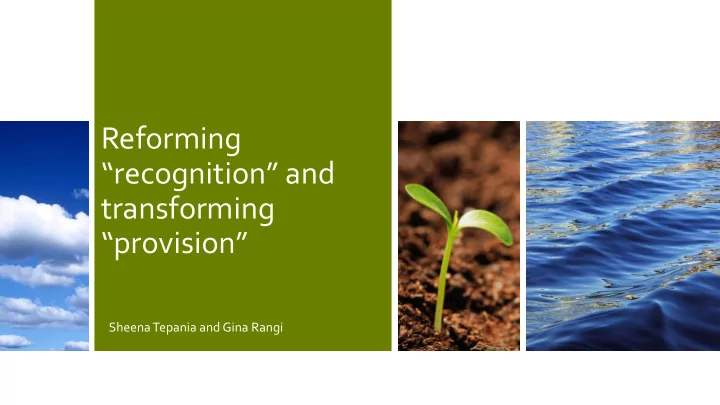

Reforming “recognition” and transforming “provision” Sheena Tepania and Gina Rangi
• We are presenting a personal view • It is not THE Māori view 2 10/2/2018 Add a footer
This presentation Key changes in the legislative environment and community expectations Our readiness as a profession to navigate those changes 3 10/2/2018 Add a footer
Treaty Settlement legislation The first 15 years – ineffective relationships Māori response – Treaty settlements • Kaitiakitanga and the mauri of natural resources • A radical shift in how legislation understands natural resources 4 10/2/2018 Add a footer
Treaty Settlement legislation continued As a profession we are challenged to embrace Māori notions of law, customs and values. “ the care, protection, management and use, in accordance with the kawa and tikanga maintained by the descendants of this river ” (emphasis added) 5 10/2/2018 Add a footer
Freshwater reform Te Mana o Te Wai Integrated and holistic health of waterbodies The first right to water belongs to the waterbody itself More than ecosystem services and minimum flows, it includes the inherent natural character of a waterbody 6 10/2/2018 Add a footer
Resource Management Act reforms First, we must “recognise” Then, we must “provide for” according to the tenor and nuance of the particular relationship Caution against a one-size-fits-all approach to mitigation proposals 7 10/2/2018 Add a footer
Resource Management Act reform contd Radical transformation of natural resource law has already started. The RMA is no longer ground-breaking. It must now catch up to the new reality. We have an opportunity to re-navigate who we are, our relationship with each other and with our environment. 8 10/2/2018 Add a footer
Resource Management Act reforms contd A transformative conversation in this country has already begun. We have to tackle the big issues: the place of tikanga, kawa, spiritual and cultural understandings of the environment, the Treaty partnership, and the relationship between local government and iwi. 9 10/2/2018 Add a footer
And now to the basics – a few suggestions What is your understanding of the terminology we are required to use every day – mauri, rangatiratanga, kaitiaki, kawa, tikanga. You must have a working knowledge of Māori understandings of these concepts Are you comfortable in Māori settings, particularly in marae? 10 10/2/2018 Add a footer
Some suggestions cont’d Resources: • Ngā Pae o Te Māramatanga • Gooder, C (2018). Cultural Values Assessments. Negotiating ka̅wanatanga and rangatiratanga through local government planning processes in Aotearoa, New Zealand: a review of the literature. ( Auckland Council technical report, TR2018/008) 11 10/2/2018 Add a footer
Some suggestions cont’d Iwi Management Plans Historical Accounts, Crown Acknowledgements and Crown Apologies 12 10/2/2018 Add a footer
13 10/2/2018 Add a footer
Recommend
More recommend